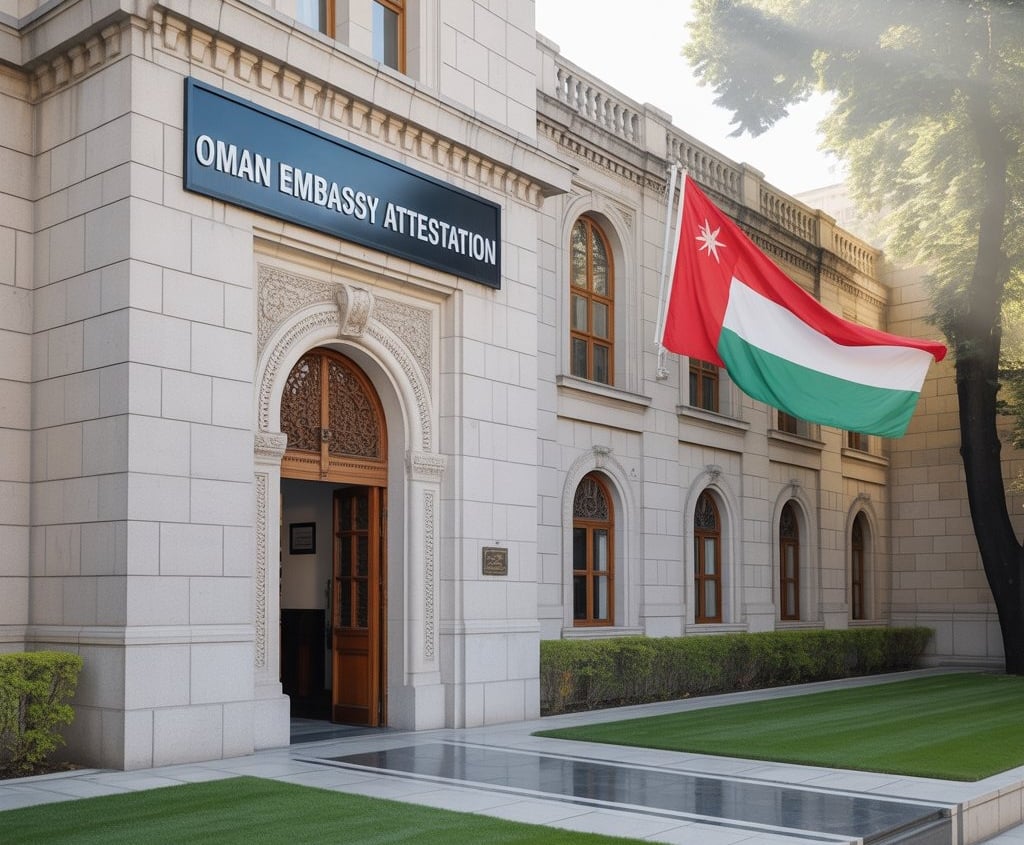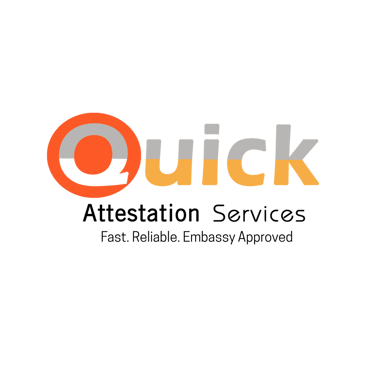Complete Guide to Oman Embassy Attestation
Discover the complete guide to Oman embassy attestation, including the detailed process, required documents, and expected timeline. Ensure your documents are properly attested for a smooth experience.
10/3/20257 min read


Introduction to Embassy Attestation
Embassy attestation refers to the process through which documents issued in one country are validated by its embassy or consulate in another country. This procedure plays a crucial role in the international recognition of documents, particularly for individuals intending to work, study, or settle in Oman. The authentication of documents is essential as it ensures that the paperwork is genuine and complies with the legal requirements of the destination country, thereby facilitating smoother transitions for expatriates.
The importance of embassy attestation cannot be overstated, especially for individuals who need to present various documents for employment, educational enrollments, or visa applications in Oman. Common documents requiring attestation include educational certificates, marriage licenses, and employment letters. By undergoing the attestation process, individuals are assured that their documents will be accepted by foreign authorities, reducing the risk of delays, rejections, or legal complications.
In the context of expatriates, attestation serves as a vital link between their home country and Oman. This procedure not only provides credibility to submitted documents but also fosters trust between the involved parties. For many foreigners, having their qualifications and personal documents validated is a necessary step before pursuing job opportunities, enrolling in academic institutions, or starting new lives in Oman.
The attestation process typically involves several steps, starting from verification by designated authorities in the home country, followed by endorsement from the Oman embassy or consulate. It is essential for individuals to understand the specific requirements and procedures for attestation as they vary depending on the document type and the country of origin. Consequently, awareness of these processes is paramount to ensure that expatriates can successfully navigate the legalities associated with their documentation in Oman.
Overall, the process of embassy attestation is a fundamental component for ensuring that documents carry the necessary legitimacy for use in Oman, promoting a seamless experience for those looking to establish themselves in the country.
Understanding the Need for Attestation in Oman
Document attestation is a crucial process for anyone looking to establish residency, seek employment, or engage in official transactions in Oman. The Omani government mandates this procedure to verify the authenticity of certain documents, ensuring that they meet legal requirements. Different types of documents typically require attestation, including educational certificates, marriage certificates, and professional licenses. Each of these documents serves a specific purpose and must be validated to facilitate various processes, such as job applications or residency permits.
The attestation of educational certificates is particularly important for individuals seeking employment in Oman. Employers require verified qualifications to assess the suitability of candidates for specific roles. Without proper attestation, there can be significant delays in the hiring process, or worse, a complete rejection of job applications. Similarly, marriage certificates are essential for expatriates intending to bring family members to Oman. These documents must be attested to verify the relationship and comply with immigration regulations.
Professional licenses also necessitate attestation, especially for those in regulated industries such as healthcare, engineering, and education. The Omani government strives to uphold standards of competence and professionalism, thus necessitating the verification of professional skills through attestation. Not securing the required attestations can lead to legal complications, including potential fines, or disqualification from practicing one’s profession in Oman.
The absence of these necessary attestations can hinder individuals' ability to establish a legal status within the country, effectively obstructing pathways for employment and residency. Thus, understanding and adhering to the attestation requirements is essential for anyone considering a long-term stay or professional engagement in Oman.
The Process of Attestation from the Home Country
The attestation process is a crucial step for anyone seeking to validate documents for use in Oman. It begins within the individual's home country and involves several systematic steps that must be followed to ensure compliance with Omani regulations. Initially, the documents that require attestation must be prepared, which typically includes educational certificates, marriage certificates, and other legal documents relevant to the purpose of staying in Oman.
Once the necessary documents are identified, they must first be notarized. This step is essential as it provides the initial layer of verification regarding the authenticity of the document. Notarization should be performed by a licensed notary public who can officially attest to the legitimacy of the signatures on the documents. Following notarization, the next step is to approach the relevant government authority for attestation. Different countries have varying authorities responsible for this task. For instance, in many cases, the Ministry of Foreign Affairs (MoFA) is involved and will need to verify the notary's signature and seal.
After acquiring the attestation from the MoFA, the documents then move to the Oman Embassy or Consulate located in the home country. This is the final stage before the documents can be deemed suitable for use in Oman. It is crucial to ensure that all documentation meets the requirements set forth by the Oman Embassy, as missing or incorrectly formatted documents can lead to delays or rejections. To mitigate potential challenges, it is advisable to consult with professionals who specialize in document attestation, as they can provide guidance and assist in ensuring compliance with both local and Omani standards. A successful attestation process ultimately paves the way for a smoother transition to Oman, allowing individuals to focus on their new endeavors in the country.
Documents Required for Embassy Attestation
When seeking embassy attestation from the Oman Embassy, it is essential to prepare a comprehensive set of documents that meets the specific requirements laid out by the embassy. The attestation process typically necessitates the submission of personal identification documents, proof of residency, and specific certificates according to the purpose of the attestation.
The primary personal identification documents include a valid passport, which serves as proof of identity and citizenship. In addition to the passport, a recent passport-sized photograph is often required for processing. Another important document is a government-issued photo ID, such as a national identity card or a driver's license, which further verifies the applicant's identity. Proof of residency, which can be in the form of a utility bill, lease agreement, or residency certificate, is needed to confirm the individual's current living situation.
Moreover, the specific documents required will depend on the purpose of the attestation. For educational purposes, attestation of academic certificates such as degrees, diplomas, and transcripts may be necessary. If the attestation is for employment, work experience certificates and offer letters might be required. Additionally, if the documents are not in Arabic or English, certified translations must be provided.
It is also advisable to include any supplementary documents that might strengthen the attestation application. For instance, affidavits or notarial certificates may be requested in certain circumstances to affirm the authenticity of the documents. Therefore, it is crucial for applicants to thoroughly review the Oman Embassy's guidelines and ensure all required documents are included in their submission. This careful preparation can significantly streamline the process and contribute to a more efficient experience in obtaining embassy attestation.
Timeline and Fees for Attestation
The attestation process for documents intended for use in Oman can vary significantly based on several factors, including the type of document, the efficiency of the home country’s bureaucratic system, and the specific requirements of the Omani embassy. Typically, the attestation process can be broken down into four primary stages: initial verification, state-level attestation, embassy attestation, and return of documents.
Initially, the verification of documents may take anywhere from one to three business days, depending on the institution issuing the document. Following this, state-level attestation, which is often required, could take an additional three to ten business days. Factors such as the backlog at government offices and the complexity of the documents can influence this duration. After the state-level attestation, applicants will submit their documents to the embassy for final approval, which generally requires an additional one to five business days. All told, the complete process, from start to finish, can range from one to three weeks.
In terms of fees associated with this process, it is essential to consider various components. Notaries may charge anywhere from $20 to $100 for their services, which include the initial verification of documents. The embassy fees can range from $50 to $200, heavily contingent on the type of document being attested. Additionally, if documents require translation, certified translation services may charge about $25 to $50 per page. Therefore, individuals looking to navigate the attestation process should budget accordingly for both time and financial costs, ensuring a smoother experience overall.
Common Challenges and How to Overcome Them
The process of Oman embassy attestation can be fraught with challenges that may stem from various factors, including incomplete documentation, misunderstanding of requirements, or unforeseen delays. One of the most common issues individuals face is the need for precise documentation. Often, documents submitted for attestation may be missing vital information or required verifications, which can lead to delays. To mitigate this, it is essential for applicants to carefully review the list of required documents provided by the embassy. Ensuring that all documents are complete, accurate, and properly authenticated beforehand can significantly streamline the process.
Another challenge that applicants face is a lack of clarity regarding the attestation requirements. The embassy may have specific stipulations that are not clearly communicated, leading to frustration. To overcome this obstacle, it is advisable for individuals to reach out to the embassy directly or consult their official website for comprehensive guidelines. Additionally, leveraging the experiences of those who have previously undergone the attestation process can provide valuable insights into the nuances of the requirements, thus enhancing understanding.
Delays caused by local authorities can also hinder the attestation process. Local offices may take longer than expected to process documents for signature or verification. To address this, applicants should establish clear lines of communication with local offices, understanding their timelines and any potential bottlenecks that may arise. Staying proactive by following up and inquiring about the status of applications can help mitigate uncertainty.
In conclusion, while the Oman embassy attestation process can present several challenges, individuals can navigate these hurdles effectively by preparing thorough documentation, understanding attestation requirements, and maintaining open communication with relevant authorities. By employing these best practices, one can reduce delays and ensure a smoother attestation journey.
Conclusion and Final Tips
In conclusion, the process of Oman Embassy attestation is a crucial step for individuals looking to validate their documents for use in Oman. Throughout this guide, we have outlined the essential steps involved in the attestation process, including the documentation required and the typical timeline one can expect. It is important to remember that adhering to these steps not only simplifies the attestation procedure but also minimizes potential delays.
To facilitate a smooth experience, it is advisable to prepare a comprehensive checklist of all necessary documents. This can include your original documents, copies, and any identification that may be required during the process. Ensuring that all documents are complete and in order will help streamline the attestation. Additionally, pay careful attention to the specific requirements set forth by the Oman Embassy, as these may vary depending on the type of document being attested.
It is also vital to verify information with official sources, as guidelines and procedures may change. The Oman Embassy’s official website can be a reliable source of updated information regarding the attestation process. This diligence will help avoid any last-minute surprises and additional complications.
If you find the attestation process overwhelming or complex, seeking professional assistance is highly recommended. Experts in document attestation can provide valuable guidance and support, ensuring that your documents meet all necessary requirements for a successful attestation. With the right preparation and care, individuals can navigate the Oman Embassy attestation process with confidence. The blend of thorough documentation, continuous checking, and professional help will unlock a smoother pathway toward achieving your attestation needs.
